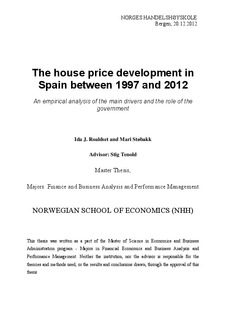The house price development in Spain between 1997 and 2012 : an empirical analysis of the main drivers and the role of the government
Master thesis
Permanent lenke
http://hdl.handle.net/11250/169529Utgivelsesdato
2012Metadata
Vis full innførselSamlinger
- Master Thesis [4372]
Sammendrag
The aim of this thesis is to consider a broad range of factors, both market based and policy based, which have contributed to the dramatic rise and fall in house prices in Spain between 1997 and the second quarter of 2012. We combine existing theories on drivers of house prices and available data on these drivers in a qualitative analysis. Our findings are then related to several empirical studies conducted by others. Finally, by considering the drivers that are related to government policy, we analyze the influence of the government on the house price development.
Our findings suggest that the land on which the Spanish houses were built is the component that increased the most in value between 1997 and 2007. We also suggest that the low rental share in Spain might have contributed to the increase in house prices towards 2008. Important drivers of demand are income, unemployment rates, tax deductions for house purchase and credit growth. However, the most important driver, which explains both the surge in house prices as well as the decline after 2008, is the presence of irrational expectations.
Our findings suggest that inconsistent housing policies and a lack of supervision of credit institutions after the entry to the EMU have had a significant effect in the creation of the Spanish housing bubble. We therefore suggest that the government influence on the house price development between 1997 and 2012 has been substantial.
